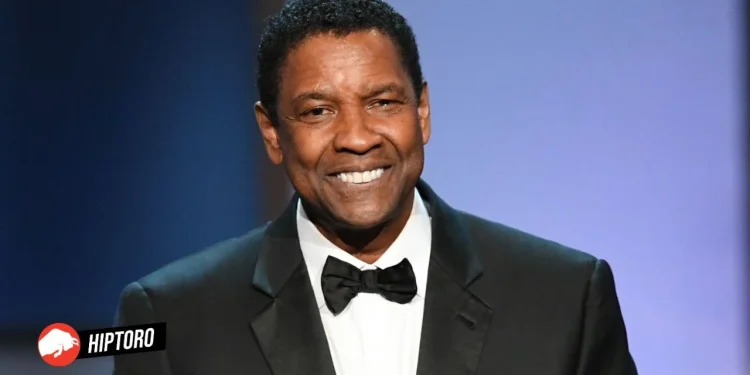Denzel Washington stands as one of the most revered and accomplished actors in the history of cinema. Born on December 28, 1954, in Mount Vernon, New York, Washington has carved out an illustrious career that spans several decades, showcasing his versatility and depth as an actor, director, and producer. With a magnetic presence and undeniable talent, Washington has become a symbol of excellence in acting, embodying a wide range of characters that have left an indelible mark on audiences and the film industry alike.
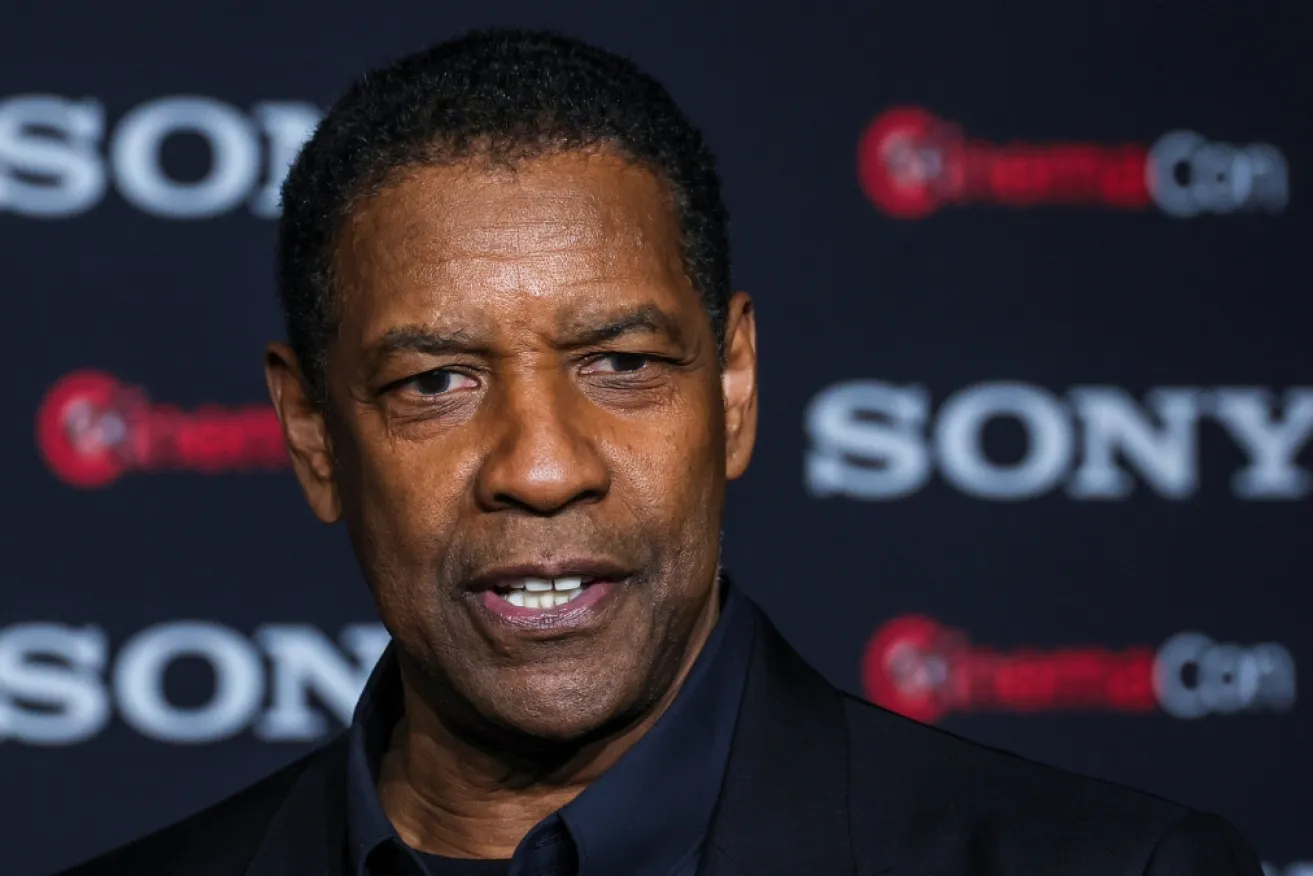
Washington’s journey into acting began at Fordham University, where he first discovered his passion for the stage. After graduating, he further honed his craft at the American Conservatory Theater in San Francisco. It wasn’t long before Washington made his mark on the screen, earning critical acclaim for his early roles in television and film. However, it was his portrayal of Dr. Phillip Chandler in the NBC medical drama series “St. Elsewhere” that first brought him widespread recognition, showcasing his ability to bring depth and complexity to his characters.
Throughout his career, Washington has demonstrated a remarkable ability to navigate a broad spectrum of genres, from drama and action to biographical films and historical narratives. His portrayal of real-life figures, such as Malcolm X in Spike Lee’s eponymous 1992 film, Steve Biko in “Cry Freedom” (1987), and Herman Boone in “Remember the Titans” (2000), has been particularly notable for its authenticity and power. These performances have not only garnered critical acclaim but have also served to highlight significant historical and social issues, reflecting Washington’s commitment to storytelling that resonates with truth and importance.
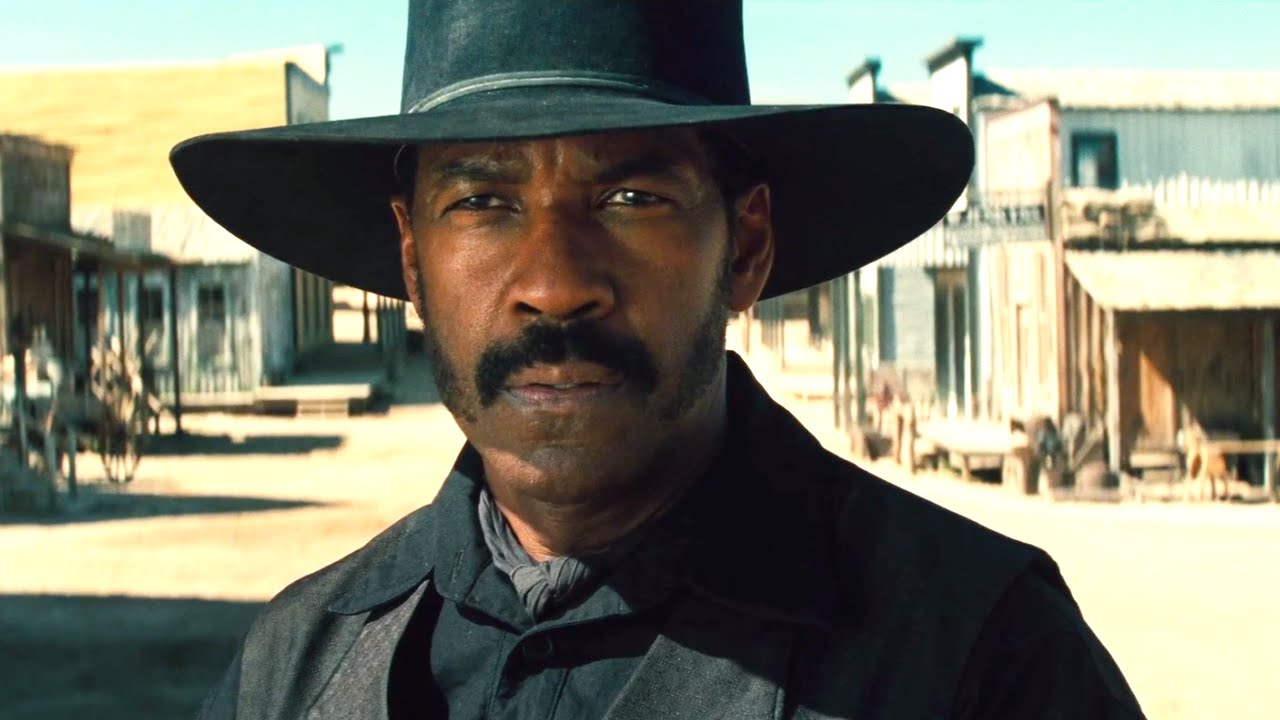
To begin with a deep introduction, Denzel Washington is an American actor, director, and producer renowned for his powerful performances and versatility across a broad range of roles. With a career spanning over four decades, Washington has become a staple figure in Hollywood, embodying characters with depth, dignity, and complexity. His work has garnered critical acclaim, including two Academy Awards: Best Supporting Actor for “Glory” (1989) and Best Actor for “Training Day” (2001), making him one of the most respected and influential actors of his generation.
Washington’s filmography is a testament to his talent and dedication, featuring a mix of blockbuster hits, critically acclaimed dramas, and character-driven stories. Whether portraying historical figures, flawed heroes, or complex antagonists, Denzel Washington brings authenticity and intensity to every role. His ability to captivate audiences and critics alike has cemented his status as a Hollywood icon whose impact on the industry and contributions to cinema will be celebrated for years to come.
Top 10 Best Movies of Denzel Washington
1. Training Day (2001)
“Training Day,” directed by Antoine Fuqua and released in 2001, stands as a monumental film in Denzel Washington’s career, showcasing his exceptional ability to dive into morally complex characters. Washington stars as Alonzo Harris, a highly decorated but morally ambiguous Los Angeles Police Department narcotics officer, giving a performance that is both charismatic and menacing. The film is a gritty, intense, and provocative exploration of corruption within the police force, challenging viewers’ perceptions of morality, justice, and heroism.
The narrative follows Jake Hoyt (Ethan Hawke), an idealistic rookie cop under the guidance of Harris on a 24-hour tour into the dangerous underbelly of drug enforcement in LA. As the day progresses, Hoyt is exposed to the brutal realities of the job and the ethical compromises his mentor makes in the name of effective policing. Washington’s portrayal of Harris is riveting, blending charm and menace in a way that keeps audiences on edge, wondering about his true motivations and moral compass.
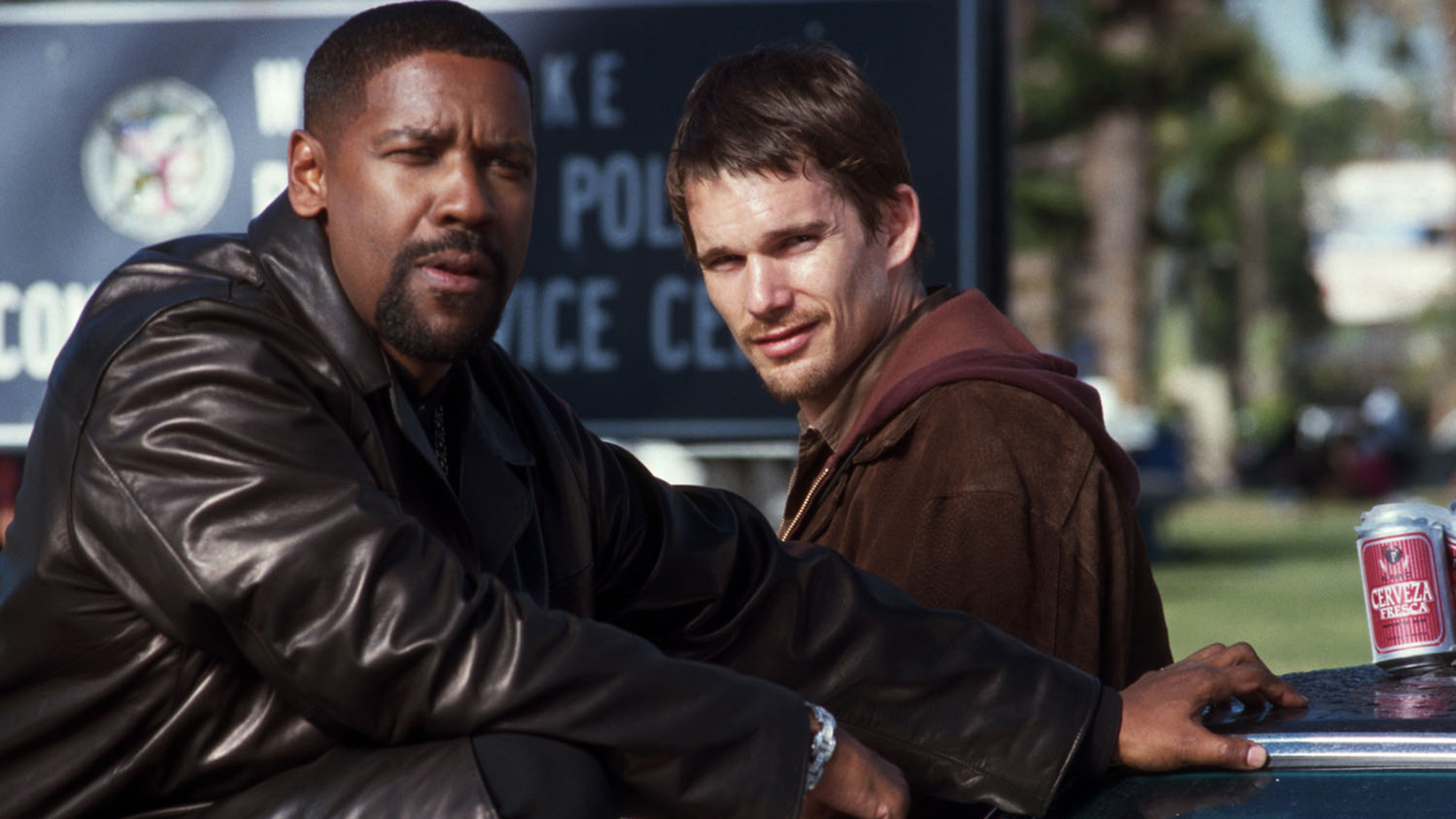
Washington’s performance in “Training Day” is a masterclass in acting, earning him an Academy Award for Best Actor. He embodies the character of Alonzo Harris with such depth and nuance that it’s hard to imagine anyone else in the role. His ability to convey complex emotions and moral ambiguity without a word is a testament to his skill as an actor. The film itself serves as a critical commentary on the systemic issues within law enforcement, touching on themes of power, corruption, and redemption.
“Training Day” was both a critical and commercial success, praised for its intense storytelling, strong performances, and Fuqua’s direction. The film’s gritty realism and moral quandaries make it a compelling watch, and its impact on the genre of crime and police dramas is undeniable. Beyond its entertainment value, “Training Day” prompts important conversations about the nature of authority and the ethical challenges faced by those who wield it.

In conclusion, “Training Day” is not only a highlight of Denzel Washington’s illustrious career but also a significant film within the crime drama genre. Washington’s portrayal of Alonzo Harris is unforgettable, offering a complex and layered character that resonates with audiences long after the credits roll. The film’s exploration of moral ambiguity, systemic corruption, and the cost of power remains relevant, making “Training Day” a timeless piece of cinema that continues to provoke thought and discussion.
2. “Glory” (1989)
American cinema, not only for its vivid portrayal of one of the Civil War’s most heroic sagas but also for spotlighting the contributions of African American soldiers in a conflict that would define the nation’s future. Directed by Edward Zwick and featuring a stellar cast led by Denzel Washington, Morgan Freeman, Matthew Broderick, and Cary Elwes, “Glory” recounts the valor and struggle of the 54th Massachusetts Infantry Regiment, one of the first official African American units in the United States during the Civil War. The film is celebrated for its historical accuracy, emotional depth, and powerful performances, particularly Washington’s, which earned him an Academy Award for Best Supporting Actor.
Denzel Washington’s performance as Private Silas Trip, a defiant and disillusioned runaway slave, is a standout. Washington imbues the character with a complex mix of anger, vulnerability, and determination, capturing the essence of a man who has endured unimaginable suffering yet possesses an unbreakable spirit.
His portrayal is a poignant reminder of the individual stories of bravery and pain that coalesced into the broader narrative of the Civil War and the fight for freedom and equality. The film’s most memorable moments often involve Trip, from his brutal flogging, which becomes a turning point in the film, symbolizing both the injustice African American soldiers faced and their indomitable will to overcome it, to his rallying cry in the face of near-certain death.
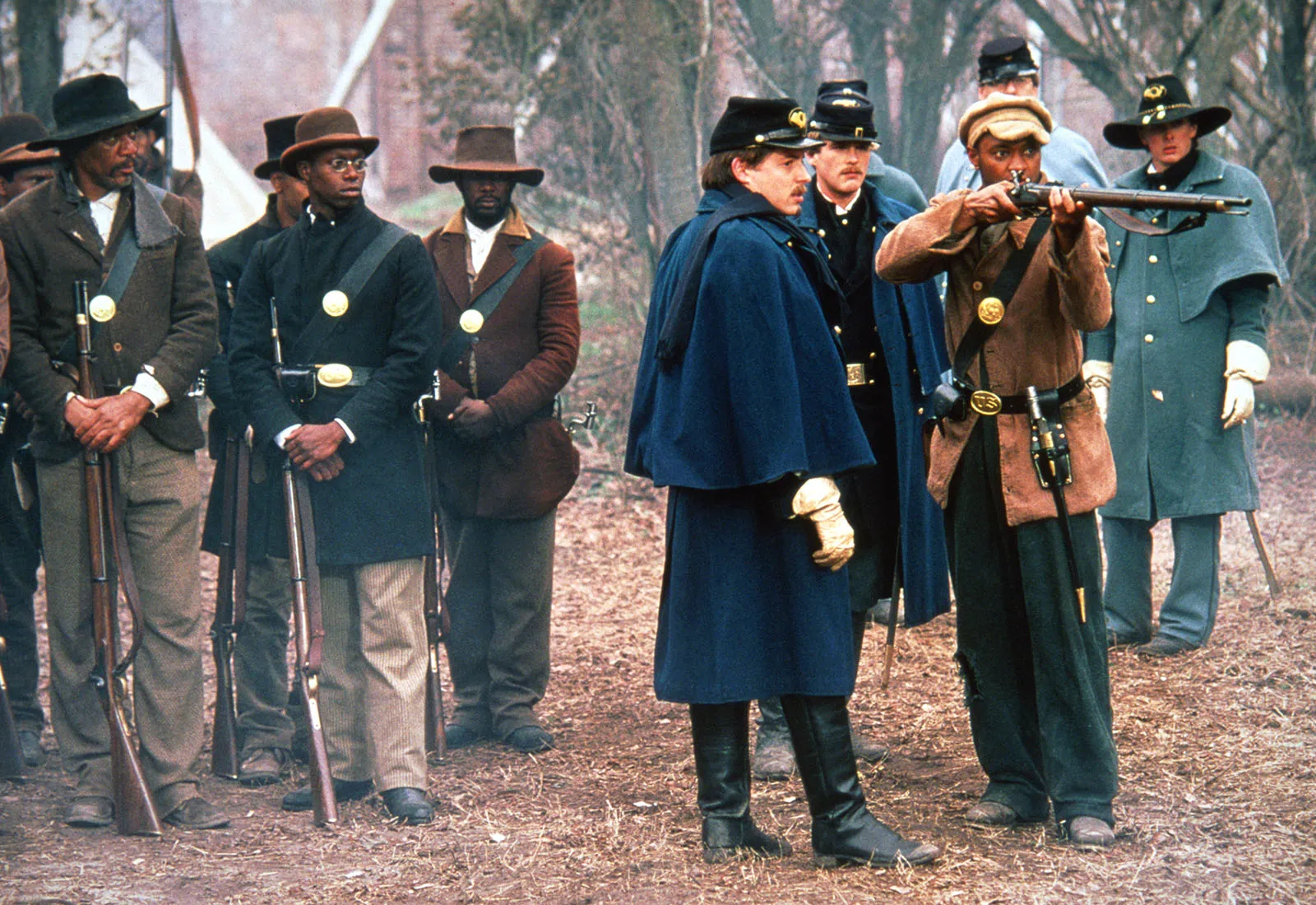
“Glory” is also notable for its unflinching depiction of the racism and discrimination that the 54th Regiment faced, not only from the Confederate enemy but from their own Union Army. These themes are handled with sensitivity and depth, highlighting the internal and external battles these soldiers fought. The film’s commitment to authenticity extends to its meticulous attention to detail in costumes, settings, and military tactics, immersing viewers in the era’s harsh realities and the fierce beauty of its ideals.
The cinematography and score play pivotal roles in elevating “Glory” from a mere historical recounting to an evocative cinematic experience. Freddie Francis’s cinematography captures the brutality of battle and the quiet moments of introspection with equal skill, while James Horner’s haunting score underscores the film’s emotional and thematic undertones, adding layers of depth to the narrative.

In conclusion, “Glory” is not just a film about the Civil War; it’s a testament to the human spirit’s resilience and the enduring quest for justice. Through its portrayal of the 54th Massachusetts Infantry Regiment, the film honors the memory of those who fought and died for a cause greater than themselves. Denzel Washington’s Oscar-winning performance is a key element of the film’s impact, offering a window into the soul of a man fighting for his rightful place in history. “Glory” remains a powerful reminder of the sacrifices made in the pursuit of freedom and equality, resonating with audiences as a poignant narrative of courage, sacrifice, and the unyielding hope for a better future.
3. Malcolm X (1992)
Spike Lee’s “Malcolm X” is a biographical epic that stands as a towering achievement in both Lee’s directorial career and Denzel Washington’s acting repertoire. Released in 1992, the film chronicles the life, philosophy, and legacy of Malcolm X, one of the most influential African American leaders in the history of the United States. Washington’s portrayal of Malcolm X is nothing short of monumental, capturing the complexity, charisma, and transformative journey of a man who evolved from a petty criminal to a powerful voice for civil rights before his assassination in 1965.
From the very beginning, “Malcolm X” sets itself apart with its rich narrative depth, exploring the various phases of Malcolm’s life with an attention to detail that is both educational and deeply moving. The film spans Malcolm’s early life in Lansing, Michigan, his tumultuous youth involved in crime, his incarceration, his conversion to Islam under the Nation of Islam, and his later years as a human rights activist who preached racial equality and unity. Washington embodies Malcolm with an intensity and dedication that is palpable, delivering powerful speeches and quiet moments of introspection with equal prowess. His performance is a study of the evolution of character, reflecting the changes in Malcolm’s ideology and approach as he matures and gains a broader understanding of the world around him.
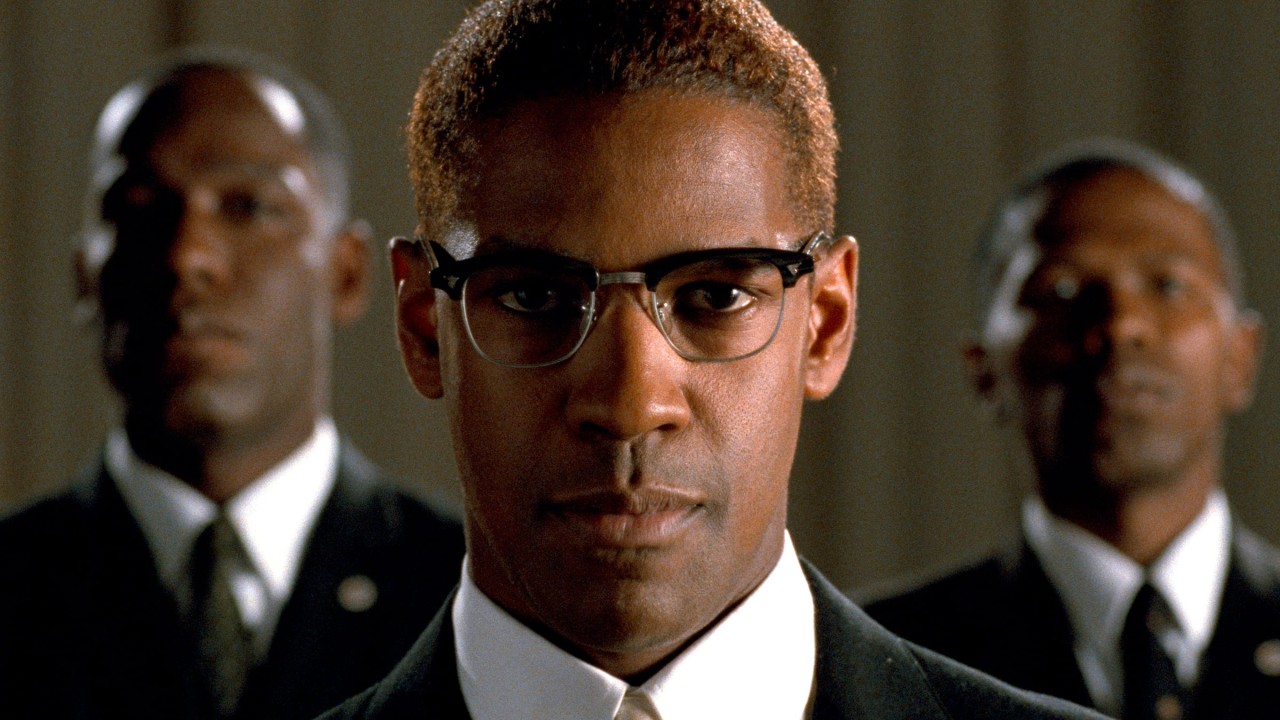
Spike Lee’s direction and the screenplay, which Lee co-wrote with Arnold Perl, are ambitious in scope, aiming to capture not just the man but the movement and the moment in American history that Malcolm X represented. The film is visually stunning, making use of a wide array of techniques, from intimate close-ups to grand, sweeping shots that capture the era’s turmoil and the scale of Malcolm’s influence. The score, composed by Terence Blanchard, complements the narrative beautifully, adding emotional depth and resonance to the story.
One of the film’s greatest strengths is its unflinching honesty. It does not shy away from the controversies and criticisms of Malcolm X, nor does it gloss over his flaws and contradictions. Instead, it presents a holistic view of a man who was constantly evolving, driven by a deep-seated desire for justice and equality. Washington’s performance is key to this portrayal as he navigates Malcolm’s complex personality with nuance and empathy. His dedication to the role was widely recognized, earning him an Academy Award nomination for Best Actor.
“Malcolm X” was more than a film; it was a cultural event that sparked discussions about race, identity, and history. It challenged viewers to reflect on Malcolm X’s legacy and the ongoing struggle for civil rights in America. The film’s impact extended beyond its theatrical release, becoming an essential part of the conversation about representation and diversity in Hollywood.

In conclusion, “Malcolm X” is a seminal work that captures the essence of one of the most dynamic and controversial figures in American history. Denzel Washington’s performance is a masterpiece of biographical portrayal, bringing Malcolm X to life with a vibrancy and complexity that remains unmatched.
4. Fences (2016)
“Fences,” directed by Denzel Washington and adapted from August Wilson’s Pulitzer Prize-winning play of the same name, is a powerful exploration of race, family, and the struggles of the African American experience in the 1950s. Washington does double duty, both behind and in front of the camera, starring as Troy Maxson, a former Negro League baseball player turned sanitation worker who grapples with his unfulfilled dreams and the realities of his life in Pittsburgh. The film is a poignant and intimate portrayal of a family navigating the complexities of love, resentment, and forgiveness.
Washington’s performance as Troy is both commanding and deeply nuanced. He brings to life a man whose external toughness and bravado mask deep-seated vulnerabilities and regrets. Troy is a complex character, full of contradictions; he is a loving father and husband who also becomes an embodiment of the very barriers he tries to protect his family from. Washington’s portrayal is a tour de force, offering a masterclass in acting that captures the essence of Troy’s tragic heroism.
Viola Davis stars opposite Washington as Rose, Troy’s wife, delivering a performance of equal power and intensity. Her portrayal of Rose’s strength, dignity, and heartbreak is mesmerizing, providing a counterbalance to Troy’s imposing presence. The chemistry between Washington and Davis is palpable, grounding the film in emotional authenticity and making their characters’ journey all the more affecting.
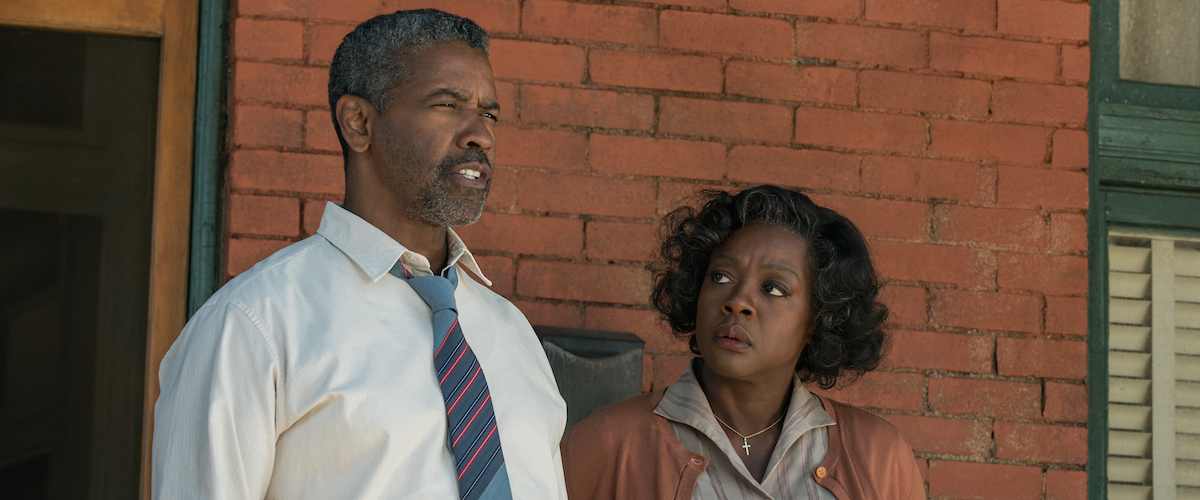
“Fences” is remarkable for its faithful adaptation of Wilson’s play, retaining the original’s dialogue-heavy scenes and theatrical structure. The film unfolds mostly within the confines of Troy and Rose’s backyard and home, a choice that emphasizes the personal and emotional landscapes of the characters. Washington’s direction is subtle and measured, allowing the performances and Wilson’s rich, lyrical dialogue to take center stage. The film’s focus on character and dialogue over action underscores the universality of its themes, making “Fences” a deeply relatable exploration of human aspirations and limitations.
The themes of “Fences” are timeless and resonate deeply, touching on the impact of systemic racism, the legacy of unfulfilled dreams, and the complexities of familial obligations and love. Troy’s struggle to reconcile his ambitions with the realities of his life speaks to the broader African American experience during the mid-20th century, a time when societal limitations often thwarted the dreams of black men and women. Yet, at its heart, “Fences” is also a universal story about the human condition, the pursuit of happiness, and the meaning of legacy.
Washington’s dual role as director and lead actor in “Fences” is a significant achievement, showcasing his versatility and commitment to bringing African American narratives to the forefront of American cinema. The film received critical acclaim upon its release, with particular praise for its performances, direction, and screenplay. Davis won the Academy Award for Best Supporting Actress for her role, while the film was also nominated for Best Picture and Best Adapted Screenplay, among others.

In conclusion, “Fences” stands as a testament to the enduring power of August Wilson’s work and the exceptional talents of Denzel Washington and Viola Davis. It is a film that transcends its historical setting to speak to the enduring challenges and beauty of the human experience. Washington’s portrayal of Troy Maxson is a career-defining role, further cementing his status as one of the greatest actors of his generation.
5. Philadelphia (1993)
“Philadelphia,” directed by Jonathan Demme and released in 1993, is a groundbreaking film that marked one of the first mainstream Hollywood movies to tackle the subjects of HIV/AIDS, homosexuality, and discrimination with depth and compassion. Denzel Washington stars as Joe Miller, a personal injury lawyer who initially harbors homophobic prejudices but undergoes a profound transformation as he takes on the case of Andrew Beckett (played by Tom Hanks), a talented lawyer who has been unjustly fired from his prestigious law firm because of his AIDS diagnosis. Washington’s role as Miller is pivotal, offering a nuanced portrayal of a man confronting his own biases and societal prejudices, ultimately embodying the themes of empathy, justice, and change.
“Philadelphia” is as much a story about personal transformation as it is a legal drama. Washington’s character starts as someone uncomfortable and dismissive towards people with AIDS and the LGBTQ+ community. However, as he comes to know and understand Beckett’s plight, Miller’s perspective shifts dramatically. Washington handles this transformation with great skill, slowly peeling back layers of prejudice and ignorance to reveal a core of decency and humanity. His journey from skepticism to advocacy is compelling and serves as a critical narrative arc that mirrors broader societal shifts in understanding and acceptance.
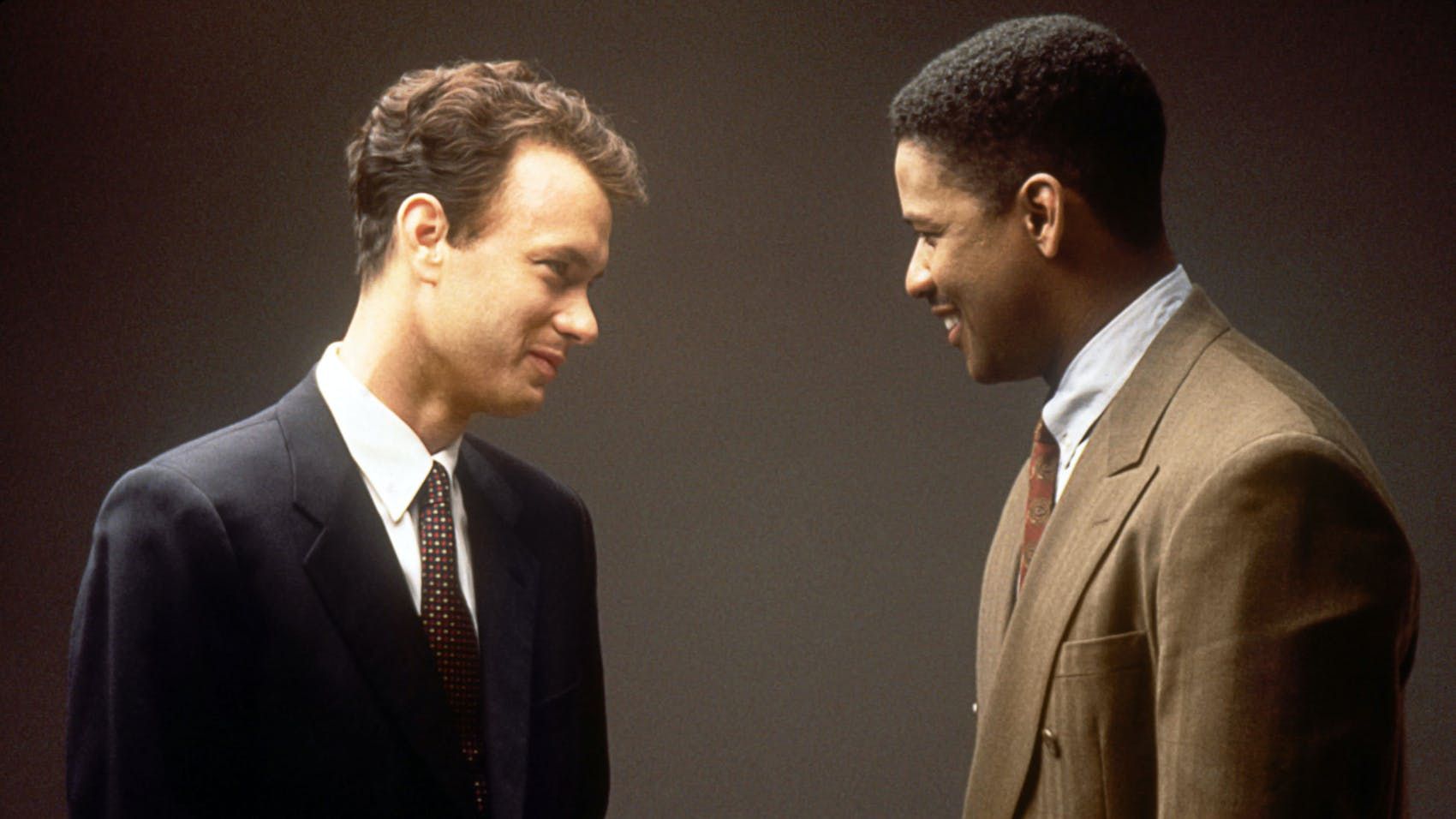
Tom Hanks delivers an Oscar-winning performance as Andrew Beckett, bringing sensitivity and dignity to the role. The dynamic between Hanks and Washington is central to the film’s emotional impact, highlighting their characters’ mutual growth and the deepening of their relationship as they battle against a backdrop of ignorance and fear. The courtroom scenes, in particular, showcase Washington’s ability to convey both the intensity of the legal battle and the personal stakes involved.
The film’s direction by Jonathan Demme is thoughtful and deliberate, blending elements of drama and social commentary without veering into didacticism. Demme uses close-ups and intimate framing to emphasize the human aspect of the story, focusing on the characters’ emotions and relationships. The soundtrack, featuring Bruce Springsteen’s “Streets of Philadelphia” and Neil Young’s “Philadelphia,” further enhances the film’s poignant atmosphere, earning Springsteen an Academy Award for Best Original Song.
“Philadelphia” was groundbreaking for its time, not only for its subject matter but also for its approach to storytelling. It tackled complex issues with grace and humanity, avoiding stereotypes and sensationalism. The film played a significant role in bringing the conversation about AIDS, discrimination, and gay rights into the mainstream, helping to humanize and destigmatize those living with HIV/AIDS.

In conclusion, “Philadelphia” stands as a landmark film in Denzel Washington’s career and in the history of American cinema. Washington’s performance as Joe Miller is a testament to his range and depth as an actor, showcasing his ability to tackle challenging roles and complex social issues. The film’s legacy extends beyond its cinematic achievements, contributing to a broader dialogue about tolerance, acceptance, and the fight against discrimination. Washington’s role in “Philadelphia” remains a powerful example of cinema’s ability to reflect and influence societal change, making it a crucial part of his distinguished filmography.
6. Remember the Titans (2000)
“Remember the Titans,” directed by Boaz Yakin and released in the year 2000, is an inspirational sports drama that transcends the typical boundaries of its genre to explore themes of racism, integration, and the power of unity. Set in 1971, the film is based on the true story of the T.C. Williams High School football team in Alexandria, Virginia, as it becomes the city’s first integrated team.
Denzel Washington stars as Coach Herman Boone, a role that showcases his exceptional ability to portray inspiring leadership and nuanced human emotion. Through Boone’s efforts to unify his racially divided team, Washington delivers a performance that is both commanding and compassionate, making “Remember the Titans” a standout film in his illustrious career.
The film begins with the integration of black and white students at T.C. Williams High School, a move that stirs racial tensions within the community. Washington’s character, Coach Boone, is appointed as the head coach of the school’s football team, replacing the beloved white coach, Bill Yoast (played by Will Patton), who becomes Boone’s assistant. From the outset, Boone faces hostility not only from his team but also from the community at large. Washington embodies Boone with a resilience and dignity that is inspiring, using tough love, wisdom, and an unwavering commitment to excellence to bring his team together.
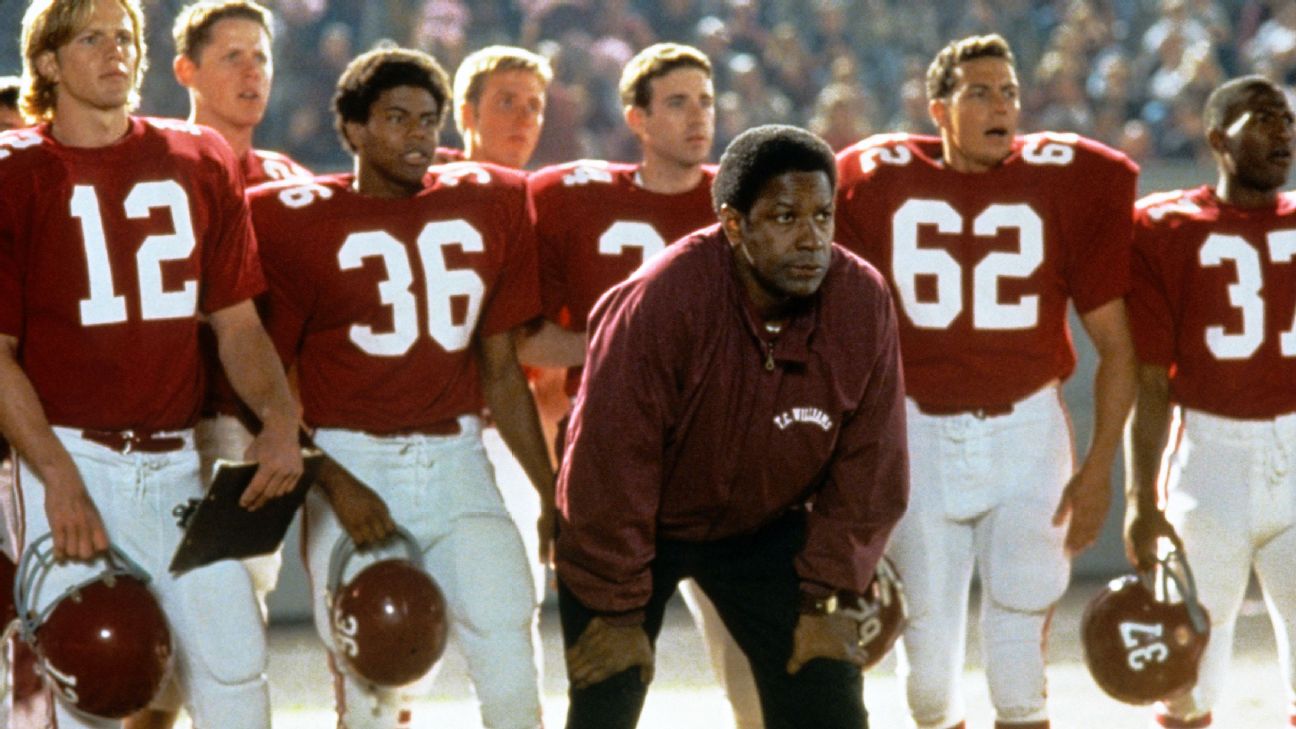
One of “Remember the Titans'” most significant achievements is its ability to tackle serious social issues while remaining an engaging and uplifting film. The screenplay, written by Gregory Allen Howard, balances moments of tension and conflict with those of triumph and camaraderie, creating a narrative that is both impactful and accessible. Denzel Washington’s performance is central to this balance; he navigates Boone’s challenges with a depth of emotion that is palpable, from fierce determination in the face of prejudice to tender moments of vulnerability and connection with his team.
The chemistry among the cast, particularly between Denzel Washington and Patton, as well as between the actors playing the football team members, contributes to the film’s authenticity and emotional resonance. The dynamics of the team’s relationships evolve beautifully throughout the film, mirroring the broader social changes occurring in America at the time. Through their shared goal of winning, the players—and, by extension, their coaches and community—learn to look beyond race and see each other’s humanity.
“Remember the Titans” is not just a film about football; it is a film about the human spirit and the potential for change when people come together for a common purpose. It effectively uses the sports genre to deliver a powerful message about equality, respect, and understanding. The film’s memorable soundtrack, featuring classic rock and soul music from the 1970s, complements its emotional and thematic depth, enhancing the sense of time and place.

In conclusion, “Remember the Titans” is a pivotal film in Denzel Washington’s career, showcasing his versatility as an actor and his ability to inspire both on and off the screen. His portrayal of Coach Herman Boone is a reminder of the impact that one determined individual can have on the lives of many. The film’s enduring popularity and relevance attest to its quality and the importance of its message—a message that continues to resonate with audiences around the world. Through “Remember the Titans,” Denzel Washington contributes to a legacy of films that not only entertain but also challenge and uplift, making it a significant and memorable part of his distinguished body of work.
7. Flight (2012)
“Flight,” directed by Robert Zemeckis and released in 2012, is a dramatic thriller that examines themes of heroism, accountability, and addiction. Denzel Washington delivers a riveting performance as Whip Whitaker, a skilled airline pilot who miraculously lands a malfunctioning plane, saving nearly everyone on board. However, the investigation into the incident reveals that Whitaker was under the influence of alcohol and drugs at the time of the crash, leading to a complex exploration of his character and personal demons.
Denzel Washington’s portrayal of Whitaker is a masterclass in complexity and nuance. He brings to life a character who is at once deeply flawed and profoundly heroic, challenging audiences to grapple with the ambiguity of his actions. Washington’s performance conveys the weight of Whitaker’s internal struggle with addiction, guilt, and redemption, earning him widespread acclaim and an Academy Award nomination for Best Actor.
The film’s narrative structure cleverly juxtaposes the thrilling, tense sequences of the flight and crash with the slow unraveling of Whitaker’s personal life and moral quandaries. This contrast highlights the film’s central questions about the nature of heroism and the impact of personal choices. Zemeckis’s direction ensures that “Flight” remains grounded in emotional realism, using the spectacular crash as a backdrop to explore deeper human issues.
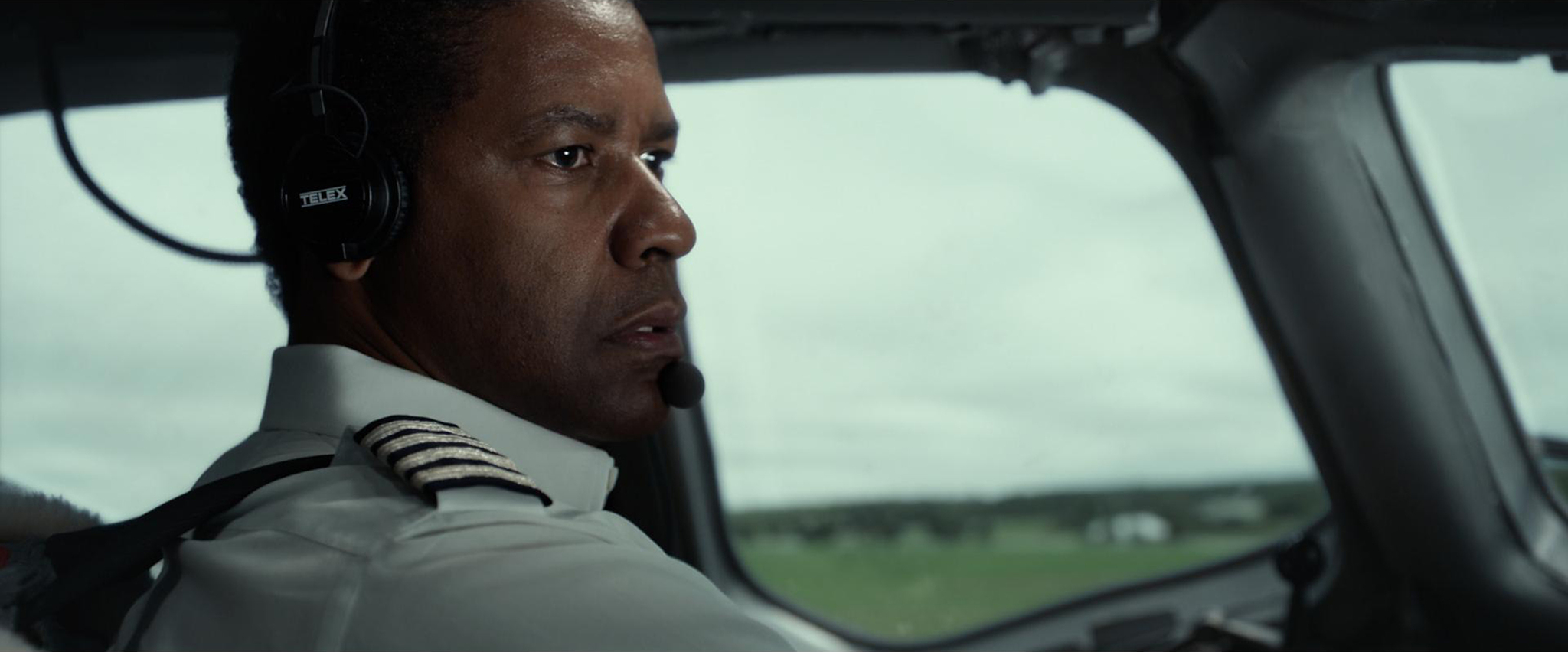
“Flight” stands out for its willingness to confront the realities of addiction head-on. The film does not shy away from depicting the destructiveness of Whitaker’s alcoholism, both to himself and to those around him. Through Denzel Washington’s performance, the film offers a raw and honest portrayal of the struggle for sobriety, making Whitaker’s journey toward taking responsibility for his actions all the more compelling.
Supporting performances, including those by Don Cheadle, Kelly Reilly, and John Goodman, enrich the narrative, providing different perspectives on Whitaker’s character and the moral complexities of the situation. The film’s dialogue and character development are sharp, with Denzel Washington’s interactions with the supporting cast adding layers of depth to the story.
The cinematography and visual effects in “Flight” are notable, particularly in the depiction of the plane’s malfunction and crash-landing. These sequences are executed with a level of realism and intensity that serves to heighten the emotional stakes of the narrative. The film’s soundtrack, featuring a mix of classic songs and original score, complements the mood and themes, enhancing the overall viewing experience.

In conclusion, “Flight” is a significant film within Denzel Washington’s career, showcasing his extraordinary talent for portraying complex, multifaceted characters. His performance as Whip Whitaker offers a powerful examination of heroism, redemption, and the human capacity for change. The film’s critical and commercial success further cements Denzel Washington’s status as one of the most talented and impactful actors of his generation, capable of elevating compelling narratives with his depth and presence.
8. American Gangster (2007)
“American Gangster,” directed by Ridley Scott and released in 2007, stands as a towering achievement in the crime genre, offering a gritty, nuanced portrayal of the life of Frank Lucas, a real-life heroin kingpin who rose to prominence in Harlem during the 1970s. Denzel Washington’s portrayal of Lucas is a captivating blend of ruthlessness, intelligence, and charm, showcasing his ability to embody complex characters who operate within moral gray areas. The film is a detailed exploration of crime, corruption, and the pursuit of the American Dream, set against the backdrop of the Vietnam War and the social upheavals of the 1970s.
Denzel Washington’s performance is at the heart of “American Gangster,” bringing Frank Lucas to life with an understated power and an air of menace that is compelling to watch. Lucas is portrayed as a man of contradictions: a brutal gangster who also cares deeply for his family, a heroin dealer who prides himself on the quality of his product, and a criminal mastermind who seeks respectability. Denzel Washington navigates these contradictions with finesse, creating a character who is at once terrifying and sympathetic. His portrayal is a study of control, using subtle gestures and expressions to convey Lucas’s complex inner world.
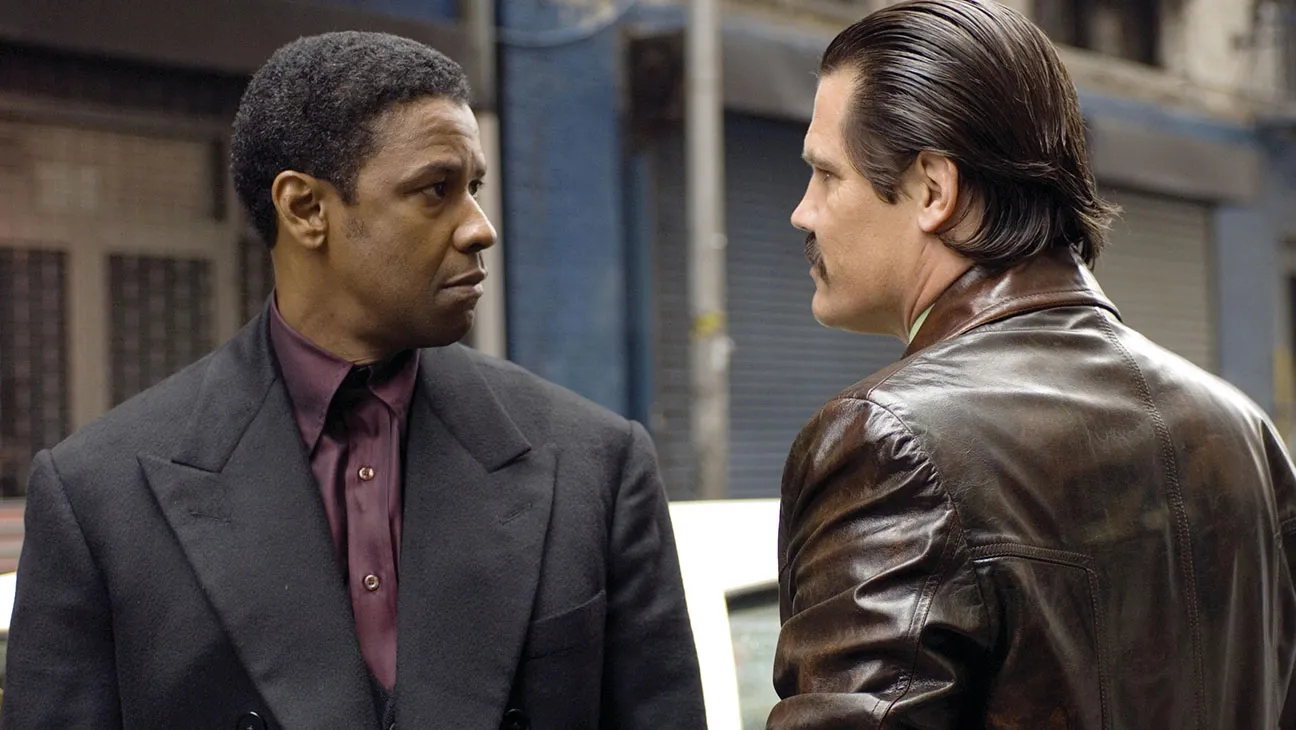
The film is characterized by its attention to detail, from the period-appropriate costumes and settings to the portrayal of the heroin trade’s inner workings. Ridley Scott’s direction ensures that “American Gangster” is not just a biopic but a sweeping epic that captures the essence of an era.
The narrative is rich and layered, exploring themes of loyalty, betrayal, and the corrupting influence of power. The film also examines the racial dynamics of crime and law enforcement, with Lucas’s rise to power serving as a commentary on the barriers faced by black entrepreneurs, even in the criminal underworld.
Russell Crowe co-stars as Richie Roberts, a New Jersey detective who becomes obsessed with bringing Lucas down. The dynamic between Lucas and Roberts adds a cat-and-mouse element to the film, with both men portrayed as flawed but fundamentally honorable. The juxtaposition of their stories highlights the film’s central theme: the blurred lines between good and evil, legal and illegal. Denzel Washington and Crowe’s performances are a major draw, providing a compelling study of two men on opposite sides of the law.
“American Gangster” was both a critical and commercial success, praised for its storytelling, performances, and direction. The film’s realism and depth make it stand out in the crime genre, offering a nuanced look at a complex figure. Denzel Washington’s role as Frank Lucas is a highlight of his career, further proving his ability to take on challenging roles and bring depth and humanity to even the most morally ambiguous characters.

In conclusion, “American Gangster” is a significant entry in Denzel Washington’s filmography, showcasing his exceptional talent and versatility. His portrayal of Frank Lucas is a reminder of his ability to captivate audiences with his performances, creating characters that resonate long after the film ends. The film itself is a masterful blend of drama, action, and historical commentary, making it a must-watch for fans of Denzel Washington and the crime genre alike.
9. The Hurricane (1999)
“The Hurricane,” directed by Norman Jewison and released in 1999, is a powerful biographical drama that tells the story of Rubin “Hurricane” Carter, a former middleweight boxer who was wrongfully convicted of murder in 1966. Denzel Washington’s portrayal of Carter is a tour de force, capturing the fighter’s resilience, determination, and quest for justice. The film is not only a commentary on Carter’s struggle but also a broader critique of racial injustice and the flaws within the American legal system. Denzel Washington’s performance is at the core of the film’s emotional and narrative impact, earning him a Golden Globe for Best Actor and an Academy Award nomination.
Denzel Washington embodies Carter with a deep sense of dignity and strength, portraying his journey from the heights of his boxing career to the depths of his wrongful imprisonment with a nuanced understanding of the character’s pain and perseverance. The film chronicles Carter’s life inside and outside the prison walls, highlighting his fight to clear his name and regain his freedom. Denzel Washington’s portrayal is deeply humanizing, showcasing the psychological and emotional toll of Carter’s wrongful conviction while also highlighting his unbreakable spirit and belief in justice.
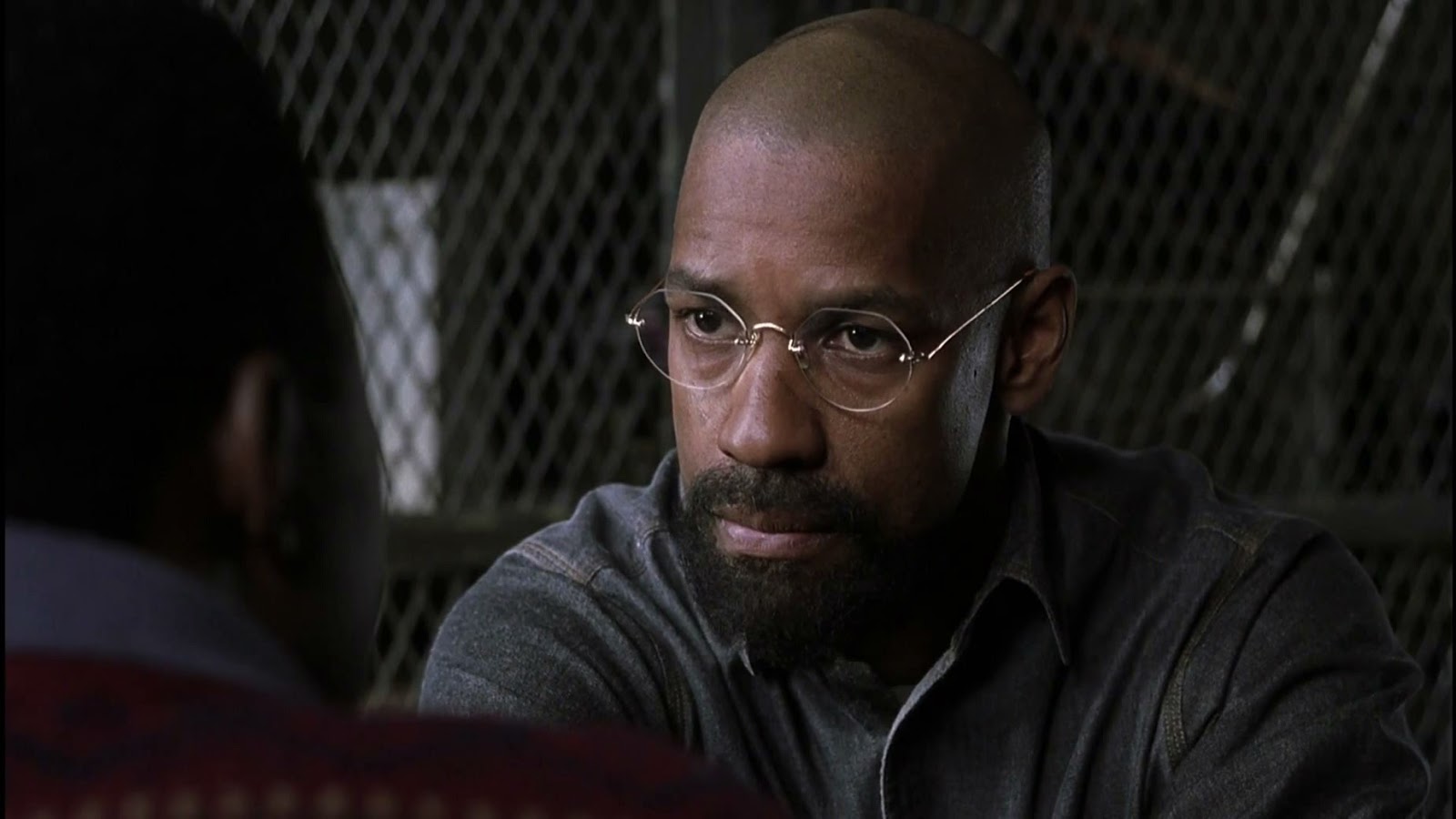
“The Hurricane” is structured around the efforts of Carter, his supporters, and a group of Canadian activists who become convinced of his innocence and work tirelessly to secure his release. The narrative weaves together Carter’s past, his legal battles, and the growing movement to free him, creating a compelling tapestry of struggle and hope. Denzel Washington’s interactions with the supporting cast, including Vicellous Reon Shannon as Lesra Martin, a young man who becomes inspired by Carter’s autobiography, add depth to the film, illustrating the impact of Carter’s story on those who rallied to his cause.
Director Norman Jewison crafts the film with a keen eye for emotional detail, utilizing flashbacks and a powerful score to enhance the story’s dramatic arcs. The cinematography and production design effectively capture the era’s essence, from the boxing rings of the 1960s to the stark confines of prison. However, it is Denzel Washington’s performance that anchors the film, his presence commanding attention and empathy.
“The Hurricane” delves into themes of racial prejudice, the power of the human spirit, and the importance of advocacy and solidarity. Carter’s case is depicted as emblematic of broader systemic issues, making the film resonate with contemporary audiences and contributing to ongoing discussions about justice and equality. The movie serves as a reminder of the individual and collective struggles against injustice, emphasizing the need for vigilance and action to correct wrongs.

In conclusion, “The Hurricane” is a standout film in Denzel Washington’s career, highlighting his ability to bring complex real-life figures to the screen with authenticity and emotional depth. His portrayal of Rubin “Hurricane” Carter is a powerful testament to the actor’s talent and the film’s message of resilience in the face of adversity. “The Hurricane” remains an important and inspiring film, not only for its cinematic achievements but also for its contribution to the dialogue on race, justice, and redemption.
10. Inside Man (2006)
“Inside Man,” directed by Spike Lee and released in 2006, marks a standout entry in the heist genre, offering a smart, tightly woven narrative that combines suspense, drama, and a touch of social commentary. Denzel Washington stars as Detective Keith Frazier, a smart, determined NYPD negotiator who finds himself at the heart of a tense standoff during a brilliantly executed bank heist led by Dalton Russell, played by Clive Owen. The film is notable for its clever plot twists, deep character studies, and moral complexities, with Denzel Washington’s performance adding significant depth and gravitas to the unfolding drama.
Denzel Washington’s portrayal of Detective Frazier showcases his ability to embody characters who are not only skilled professionals but also deeply human, with their own vulnerabilities and moral dilemmas. Frazier is portrayed as a man of integrity, caught in a web of deception and corruption that tests his ethics and determination. Denzel Washington brings a nuanced understanding of Frazier’s character, balancing the detective’s professional competence with his quest for truth and justice. His charismatic screen presence and the subtle layers he brings to the role enhance the film’s engaging narrative and thematic depth.
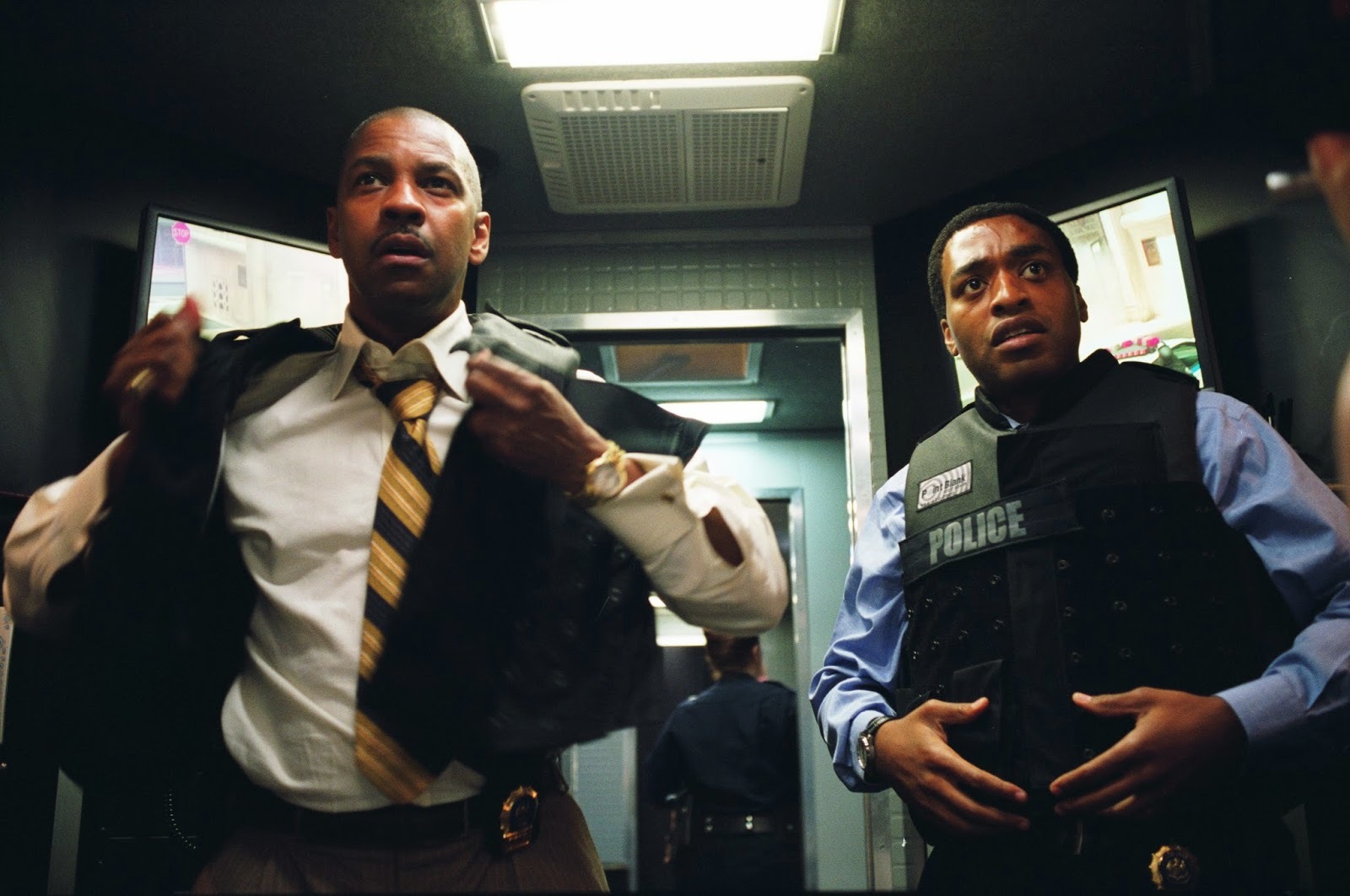
“Inside Man” is distinguished by its intelligent script, penned by Russell Gewirtz, which offers a fresh take on the heist genre by focusing not just on the mechanics of the heist itself but also on the complex human interactions and strategic mind games between the hostage-takers and the police. Spike Lee’s direction injects the film with a distinctive style, blending tension-filled sequences with moments of humor and poignant social observations. Lee and Denzel Washington’s collaboration enriches the film, making it more than just a thriller; it’s a reflection on power, greed, and the shades of gray in human nature.
The ensemble cast, including Jodie Foster, Christopher Plummer, and Willem Dafoe, delivers strong performances, but it’s Denzel Washington’s dynamic portrayal of Frazier that anchors the narrative. His character’s intellectual sparring with Owen’s mastermind criminal adds a compelling layer to the film, making their cat-and-mouse game not only a physical confrontation but also a battle of wits.

One of the film’s strengths is its ability to keep audiences guessing with plot twists that challenge preconceptions about the characters and their motivations. The heist, while meticulously planned and executed, serves as a backdrop to explore broader themes, such as racial profiling, economic inequality, and the moral ambiguities of justice. Denzel Washington’s role is critical in navigating these themes, as his character embodies the ethical compass of the story, wrestling with personal and professional conflicts that resonate with real-world issues.
In Conclusion,
Denzel Washington’s impact extends beyond his cinematic achievements. He is known for his philanthropy, particularly in the areas of education, the arts, and social justice. His commitment to using his platform to uplift others and make a tangible difference in the world is reflective of the integrity and compassion that characterize both the man and his career. Denzel Washington’s contributions to various causes demonstrate his belief in the power of art to inspire change and his dedication to leaving a positive imprint on society.
As an actor, director, and humanitarian, Denzel Washington has become an enduring icon of excellence and resilience. His body of work continues to inspire both emerging and established artists, setting a high standard for dedication, talent, and integrity in the entertainment industry. Denzel Washington’s legacy is not just in the memorable characters he has brought to life on screen but also in his unwavering commitment to making a difference in the world through his art and actions.
Denzel Washington’s career is a testament to the power of talent, hard work, and passion. His contributions to cinema and society have left an indelible mark, making him one of the most influential figures in Hollywood and beyond. As he continues to take on new roles and challenges, Denzel Washington’s legacy as a transformative actor and a force for good remains unmatched. His journey reflects a dedication to excellence that transcends the screen, inspiring future generations to pursue their dreams with the same commitment and integrity that he has demonstrated throughout his remarkable career.


